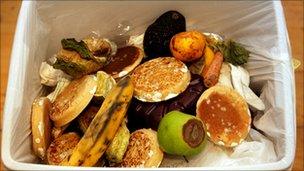Anaerobic digester plan for Gwynedd food waste approved
- Published

The plant will be able to treat food waste and produce electricity at the same time
A plan to build a plant to treat food waste has been given the go-ahead by Gwynedd councillors.
The council anaerobic digester at Llwyn Isaf near Clynnog will deal with 15,000 tonnes of food waste collected in the county.
As part of the process the digester will also produce electricity, which can be exported to the national grid.
Local people protested when the Llwyn Isaf site was reopened as a "temporary landfill" tip in 2009.
Councillors were told that the landfill would continue until the end of 2013, and it was intended to run the digester by the end of 2012.
They were also told the bid "satisfies the requirements in terms of access, character, design, ecology, community safety and environmental sustainability".
'Residents' concerns'
Clynnog Fawr Community Council said it had no objection in principle based on the fact that recycling was much better than landfill.
The council added: "But there is a need for an appropriate monitoring and management plan for the site, as a result of concerns raised by local residents".
Other comments come from the Countryside Council for Wales (CCW), because the site could have an impact on Cors Eifionydd European Nature Conservation Area, and the nearby Area of Outstanding Natural Beauty.
CCW said assessment should be made to ensure there will be no significant impact on Cors Eifionydd.
In conclusion the report noted that food waste accounts for about 50% of all organic domestic waste.
"There are substantial environmental advantages available should it be possible for it to be collected and treated," it added.
Councillors approved the development with conditions including the site working hours, and that noise, dust, and odour are monitored.
- Published14 September 2010